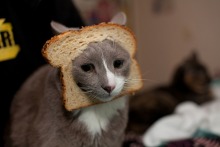It's more common than you might think
Constipation is a frequent concern in cats, particularly in older cats. Most cats will have a bowel movement once or twice a day, but a constipated cat may go 2, 3, or even 4 days between bowel movements. At which point, the experience is incredibly painful, and the cat is in a considerable amount of discomfort and pain.
How do you know a cat is constipated?
Being aware of your cat's usual elimination schedule is your best bet. You can also look for signs of distress, crying, discomfort, a belly which seems fuller or harder than usual, and a cat who visits the litter box often without anything happening.
In some cases, only liquid may be able to get around the obstructed bowel. This may cause a small amount of what may look like diarrhea.
What causes constipation in cats?
Old age, which brings with it reduced muscle tone and less activity, is often a cause. Hairballs, particularly in long-haired cats or heavy shedders, can be a problem. Other cats may intensely dislike their litter box - either its position, its shape, the type of litter, or the fact that you don't (in the cat's estimation) clean it often enough.
It's important to get to the root cause, in order to prevent future attacks of constipation before they start.
Some vets blame a diet high in carbs (see picture above) for constipation problems. Ask your vet if there is a low-carb brand that they recommend for your situation.
What can you do for a constipated cat?
A cat who becomes too constipated may experience a bowel impaction. If this is the case, it will need to go to the vet. Your vet can decide whether your cat needs surgery, manual intervention, an enema, or medication.
If your cat is constipated, keep a close eye on it. Constipation can be extremely dangerous if it goes too far.
How to prevent constipation in cats?
Your vet can assess your cat's diet and provide advice. You can add canned pumpkin or unflavored psyllium husks to your cat's diet (about 1 tsp per day, sprinkled on kitty's food), change from a dry diet to a diet of canned food, switch to a "senior cat" or "hairball care" formula which will include more roughage, and give your cat a hairball formula like Petromalt.
Regular exercise is great for your cat, and it can also help with constipation. Grab one of those "feather on a string" toys and get your cat jumping!
It's also important to ensure that your cat is drinking enough water. You might want to get one of those fancy cat watering fountains which offers moving water, which many cats find more appealing than a bowl of still water.
In extreme or chronic cases, your vet may prescribe medicine for your cat to take on a regular basis.
